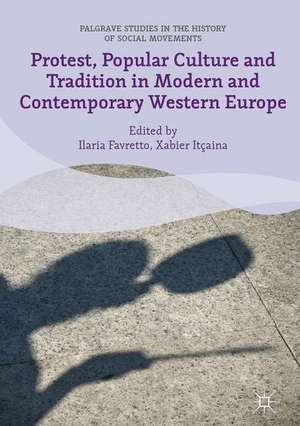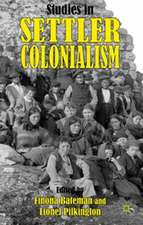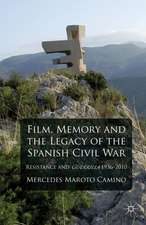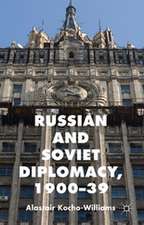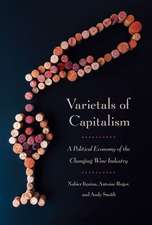Protest, Popular Culture and Tradition in Modern and Contemporary Western Europe: Palgrave Studies in the History of Social Movements
Editat de Ilaria Favretto, Xabier Itcainaen Limba Engleză Hardback – 18 apr 2017
Din seria Palgrave Studies in the History of Social Movements
- 18%
 Preț: 754.31 lei
Preț: 754.31 lei - 9%
 Preț: 833.81 lei
Preț: 833.81 lei -
 Preț: 409.20 lei
Preț: 409.20 lei -
 Preț: 370.62 lei
Preț: 370.62 lei - 18%
 Preț: 760.38 lei
Preț: 760.38 lei - 15%
 Preț: 561.88 lei
Preț: 561.88 lei - 18%
 Preț: 709.23 lei
Preț: 709.23 lei - 15%
 Preț: 671.91 lei
Preț: 671.91 lei -
 Preț: 399.20 lei
Preț: 399.20 lei -
 Preț: 370.78 lei
Preț: 370.78 lei -
 Preț: 402.72 lei
Preț: 402.72 lei - 15%
 Preț: 568.32 lei
Preț: 568.32 lei - 18%
 Preț: 862.86 lei
Preț: 862.86 lei - 18%
 Preț: 707.55 lei
Preț: 707.55 lei - 18%
 Preț: 753.25 lei
Preț: 753.25 lei -
 Preț: 370.04 lei
Preț: 370.04 lei -
 Preț: 369.67 lei
Preț: 369.67 lei - 18%
 Preț: 916.91 lei
Preț: 916.91 lei - 18%
 Preț: 703.61 lei
Preț: 703.61 lei -
 Preț: 465.50 lei
Preț: 465.50 lei - 18%
 Preț: 756.28 lei
Preț: 756.28 lei -
 Preț: 434.13 lei
Preț: 434.13 lei - 15%
 Preț: 569.74 lei
Preț: 569.74 lei - 15%
 Preț: 558.58 lei
Preț: 558.58 lei - 18%
 Preț: 761.62 lei
Preț: 761.62 lei - 15%
 Preț: 683.54 lei
Preț: 683.54 lei - 18%
 Preț: 708.46 lei
Preț: 708.46 lei -
 Preț: 466.44 lei
Preț: 466.44 lei - 15%
 Preț: 678.66 lei
Preț: 678.66 lei - 18%
 Preț: 701.77 lei
Preț: 701.77 lei -
 Preț: 370.41 lei
Preț: 370.41 lei - 18%
 Preț: 918.59 lei
Preț: 918.59 lei - 15%
 Preț: 685.90 lei
Preț: 685.90 lei -
 Preț: 438.59 lei
Preț: 438.59 lei -
 Preț: 376.90 lei
Preț: 376.90 lei
Preț: 700.29 lei
Preț vechi: 769.55 lei
-9% Nou
Puncte Express: 1050
Preț estimativ în valută:
134.03€ • 141.39$ • 111.69£
134.03€ • 141.39$ • 111.69£
Carte tipărită la comandă
Livrare economică 30 decembrie 24 - 04 ianuarie 25
Preluare comenzi: 021 569.72.76
Specificații
ISBN-13: 9781137507365
ISBN-10: 1137507365
Pagini: 256
Ilustrații: XXIII, 273 p. 8 illus., 3 illus. in color.
Dimensiuni: 148 x 210 x 24 mm
Greutate: 0.6 kg
Ediția:1st ed. 2017
Editura: Palgrave Macmillan UK
Colecția Palgrave Macmillan
Seria Palgrave Studies in the History of Social Movements
Locul publicării:London, United Kingdom
ISBN-10: 1137507365
Pagini: 256
Ilustrații: XXIII, 273 p. 8 illus., 3 illus. in color.
Dimensiuni: 148 x 210 x 24 mm
Greutate: 0.6 kg
Ediția:1st ed. 2017
Editura: Palgrave Macmillan UK
Colecția Palgrave Macmillan
Seria Palgrave Studies in the History of Social Movements
Locul publicării:London, United Kingdom
Cuprins
Preface.- 1. Introduction: Looking Backward to Move Forward. Why appreciating tradition can improve our understanding of modern protest. Ilaria Favretto and Xabier Itcaina.- 2. “The Modernity of Tradition”: Popular protest in 19th c. Germany. James Brophy.- 3. Charivari and the 1876 Italian elections. Enrico Baroncini.- 4. Peasant Resistance Traditions and the Irish War of Independence, 1918 21. John Borgonovo.- 5. A Fight for the Right to get Drunk: The Autumn Fair Riot in Eskilstuna, 1937. Stefan Nyzell.- 6. Italian anarchism and popular culture: History of a close relationship. Marco Manfredi.- 7. Persistent repertoires of contention in Portugal: From tax riots to anti communist violence (1840 1975). Diego Palacios Cerezales.- 8. Carnivalesque and charivari repertoires in 1960s and 1970s Italian Protest. Ilaria Favretto and Marco Fincardi.- 9. Popular Justice and Informal Politics: The Charivari in Nineteenth and Twentieth Century France. Xabier Itçaina.- 10. Tactical Carnival and the Global Justice Movement: The Clown Army and Clownfrontational Protest. Lawrence Bogad.- 11. Conclusion. Popular culture, folk traditions and protest: a research agenda. Xabier Itçaina.- 12. Afterword. Old and new repertories of contention. Donatella della Porta.
Notă biografică
Ilaria Favretto is Professor of Contemporary European History at Kingston University, UK. She has published on the British and the Italian Left after 1945; on memory and identity in post-war Italy; and most recently, on Italian factory protest in the period after 1945.
Xabier Itçaina is CNRS Research fellow-HDR in Political Sociology at the Centre Emile Durkheim, France, Sciences Po Bordeaux, France, and a former Marie Curie Fellow (2012-2013) at the European University Institute, Italy. His research focuses on the politics of Catholicism, social economy and local development, political anthropology and identity politics.
Xabier Itçaina is CNRS Research fellow-HDR in Political Sociology at the Centre Emile Durkheim, France, Sciences Po Bordeaux, France, and a former Marie Curie Fellow (2012-2013) at the European University Institute, Italy. His research focuses on the politics of Catholicism, social economy and local development, political anthropology and identity politics.
Textul de pe ultima copertă
Mock funerals, effigy parading, smearing with eggs and tomatoes, pot-banging and Carnival street theatre, arson and ransacking: all these seemingly archaic forms of action have been regular features of modern European protest, from the 19th to the 21st century. In a wide chronological and geographical framework, this book analyses the uses, meanings, functions and reactivations of folk imagery, behaviour and language in modern collective action. The authors examine the role of protest actors as diverse as peasants, liberal movements, nationalist and separatist parties, anarchists, workers, students, right-wing activists and the global justice movement. So-called traditional repertoires have long been described as residual and obsolete. This book challenges the conventional distinction between pre-industrial and post-1789 forms of collective action, which continues to operate as a powerful dichotomy in the understanding of protest, and casts new light on rituals and symbolic performances that, albeit poorly understood and deciphered, are integral to our protest repertoire.
Ilaria Favretto is Professor of Contemporary European History at Kingston University, UK. She has published on the British and the Italian Left after 1945; on memory and identity in post-war Italy; and most recently, on Italian factory protest in the period after 1945.
Xabier Itçaina is CNRS Research fellow-HDR in Political Sociology at the Centre Emile Durkheim, France, Sciences Po Bordeaux, France, and a former Marie Curie Fellow (2012-2013) at the European University Institute, Italy. His research focuses on the politics of Catholicism, social economy and local development, political anthropology and identity politics.
Ilaria Favretto is Professor of Contemporary European History at Kingston University, UK. She has published on the British and the Italian Left after 1945; on memory and identity in post-war Italy; and most recently, on Italian factory protest in the period after 1945.
Xabier Itçaina is CNRS Research fellow-HDR in Political Sociology at the Centre Emile Durkheim, France, Sciences Po Bordeaux, France, and a former Marie Curie Fellow (2012-2013) at the European University Institute, Italy. His research focuses on the politics of Catholicism, social economy and local development, political anthropology and identity politics.
Caracteristici
Challenges the conventional distinction between pre-industrial and post-1789 collective forms of action Deals comprehensively with the history of European protest from the 19th to 21st century Examines the uses, meanings, imagery, functions, and revivals of protest movements in contemporary European political discourse
